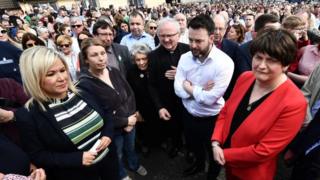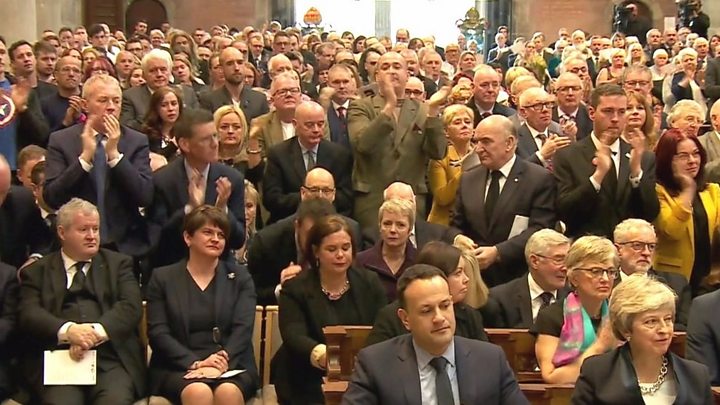 Image copyright
Getty/Charles McQuillan
Image copyright
Getty/Charles McQuillan
A fresh round of talks aimed at restoring devolution in NI will begin later, in a bid to end nearly two and a half years of political deadlock.
The talks were announced by the British and Irish governments after the murder of journalist Lyra McKee.
At her funeral, politicians came under pressure to solve the Stormont impasse.
The talks are beginning just days after council elections, which saw a surge of support for smaller parties not aligned to either unionism or nationalism.
Most notably, Northern Ireland's fifth largest party, Alliance, saw its number of council seats rise from 32 to 53 - an increase of 65%.
The Democratic Unionist Party (DUP) and Sinn Féin were again returned as the two largest parties in the council elections, but they had mixed fortunes.
The DUP lost eight of its 130 seats and, although Sinn Féin's seat count held steady at 105, there was a slight drop (0.8%) in the party's share of first preference votes.
Will the council election results affect the Stormont stand-off?
Last week's vote has not completely changed Northern Ireland's overall political landscape - the electorate is still sharply divided along traditional unionist and nationalist lines - but it has given the two biggest parties something to think about as they enter the latest talks.
Not only did Alliance's seat count rise, the party also achieved an almost 5% jump in its share of first preference votes, topping the poll in several areas and breaking new ground outside its greater Belfast support base.
Alliance, a sister party of the Liberal Democrats in Great Britain, tries to appeal to communities across the political spectrum in Northern Ireland, but even after last Thursday's success, it still remains in fifth place.
Other smaller parties like the Greens and People Before Profit also did well in last week's poll, but they were starting from a low base.
The Green Party doubled its council seats from four to eight, while People Before Profit's representation jumped from one councillor to five.
Conversely, the Ulster Unionists had a poor election, losing 13 seats; the nationalist Social Democratic and Labour Party (SDLP) lost seven seats and the Traditional Unionist Voice (TUV) lost six of the 13 seats it won five years ago.
Alliance and the Greens have claimed that their success is a sign that voters are getting fed up with "old-style" or "tribal" politics and now want compromise to resolve the Stormont stalemate.
What's been going on at Stormont?
The DUP and Sinn Féin have been involved in a bitter stand-off since Northern Ireland's devolved government collapsed in January 2017.
Sinn Féin pulled the plug on its power-sharing coalition with the DUP in protest over a green energy financial scandal.
The DUP, and in particular its leader, Arlene Foster, was criticised over a failure to control the costs of the Renewable Heat Incentive (RHI) scheme, and it became the subject of a public inquiry.
The RHI inquiry is yet to publish its findings, but even when it does, Sinn Féin has refused to return to government until there is agreement on a number of other outstanding issues.
In particular, the party wants a stand alone Irish language act, the legalisation of same-sex marriage and reform of a Stormont veto known as the petition of concern, which the DUP used to block same-sex marriage.

For its part, the DUP has argued that the Northern Ireland Assembly is the place to resolve such matters democratically, and has called for the immediate restoration of devolution.
The two parties came close to announcing a deal in February 2018, but talks fell apart due to disagreement over a "stand-alone" Irish language act.
Civil servants have been running public services.
What has changed since the last time the talks fell apart?
The latest attempt to save Stormont follows public outcry over the killing last month of Lyra McKee.
The 29-year-old journalist was observing a riot in Londonderry when dissident republicans opened fire on police.
Ms McKee was shot in the head and died a short time later.
Fr Martin Magill was applauded when he asked them: "Why in God's name does it take the death of a 29-year-old woman with her whole life in front of her to get to this point?"

The priest's remarks made headlines around the world, and two days later the British and Irish governments announced that fresh talks would begin on Tuesday 7 May.
Unusually, the talks are taking place in the middle of a European election campaign.
Are there signs of a breakthrough this time?
Yes and no. Public criticism at Ms McKee's funeral from Fr Magill saw the leaders of the DUP and Sinn Féin appear visibly uncomfortable.
The priest later said people in the church put "pressure" on the politicians to stand up together and he described this as a "metaphor" for public opinion on the Stormont deadlock.
But shortly after fresh talks were announced, Sinn Féin's deputy leader, Michelle O'Neill, insisted her party "will not acquiesce in the denial of rights".
She said the talks would be "a test" for the DUP, and she added that if no solution is found this time, the British and Irish governments should step in and remove "obstacles" to devolution, such as the ban on same-sex marriage and the absence of Irish language legislation.
Last week's council elections were something of a test for the DUP's traditional support base because its first ever openly-gay candidate, Alison Bennington, was elected with the endorsement of the party leadership.
However, DUP leader Arlene Foster said Ms Bennington's election did not necessarily mean a shift in the party's policy on same-sex marriage.
Although Sinn Féin's overall council seat tally remained at 105, the party lost five sitting councillors from Derry and Strabane Council.
Sinn Féin MLA Conor Murphy told BBC Radio Ulster: "I don't doubt that there was a reaction to that awful murder [of Lyra McKee] in Derry which affected parties right across the board."
Mr Murphy also said the surge in support for Alliance and the Greens "surprised everyone" and he acknowledged voters may have expressed "frustration" over the political deadlock at Stormont.